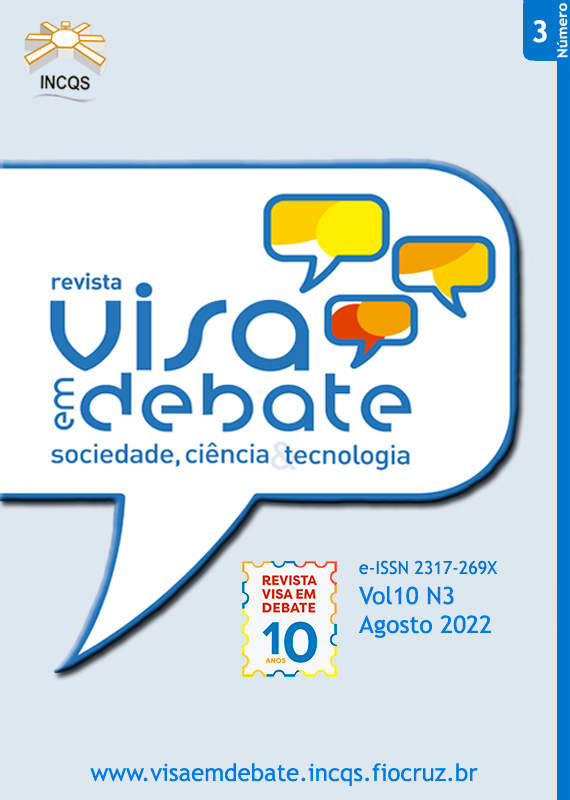Adverse drug events among older adults in Brazil before and after the onset of the COVID-19 pandemic
DOI:
https://doi.org/10.22239/2317-269x.02045Keywords:
Aged, Drug-Related Side Effects and Adverse Reactions, Adverse Drug Reaction Reporting Systems, COVID-19Abstract
Introduction: Harm resulting from adverse drug events (ADE) is among the most frequent in the world. Therefore, its monitoring is essential, especially among older adults, who are at greater risk of suffering such type of harm. Additionally, the COVID-19 pandemic, its high incidence among older adults and frequent use of off-label medications have reinforced the importance of monitoring ADE in this population. Objective: To describe the suspected ADE among older adults in Brazil before and after the beginning of the COVID-19 pandemic. Method: A description of suspected ADEs reported in the VigiMed system of the National Health Surveillance Agency was carried out, involving older adults (age ≥ 65 years) in the pre- (01/2019 to 03/2020) and post-onset of the pandemic period (04/2020 to 06/2021). The difference between the proportion of severe ADE between the periods was evaluated using Pearson’s chi-square test. Results: 57,167 suspected ADE were reported in the global period evaluated; 22.2% involved older adults. In the pre-pandemic period, 2,924 suspected ADEs were reported (44.2% were severe ADEs), especially those involving antineoplastic, antimicrobial, and anticoagulant drugs. In the post-pandemic period, 9,771 suspected ADEs were reported (57.5% severe), especially related to hydroxychloroquine and vaccines against COVID-19. The difference in the proportion of severe suspected ADE reported for the older adults between the periods evaluated was statistically significant (p < 0.001). Conclusions: ADE notifications and studies that evaluate ADE among older adults are essential to generate information that can support drug therapy optimization and prioritization of harm reduction among them, especially in the pandemic context that considerably affects this population.
Downloads
Downloads
Published
Issue
Section
License
Copyright (c) 2022 Bruna Gomes de Souza, Cristiane de Paula Rezende, Kirla Barbosa Detoni, Helaine Carneiro Capucho, Mário Borges Rosa, Nelson Machado do Carmo Júnior, Mariana Martins Gonzaga do Nascimento

This work is licensed under a Creative Commons Attribution 4.0 International License.
COPYRIGHT ALLOWANCE The author (s) hereinafter designated as the ASSIGNOR hereby assign and transfer, free of charge, the ownership of the copyrights related to this ARTICLE to the Vigilância Sanitária em Debate: Sociedade, Ciência & Tecnologia (Health Surveillance under Debate: Society, Science & Technology) – Visa em Debate, represented by FUNDAÇÃO OSWALDO CRUZ, established at Av. Brasil, nº 4365, Manguinhos, Rio de Janeiro, RJ, Brazil, CEP 21045-900, under the conditions set out below: (a) The terms and conditions set forth in this Agreement shall apply to the following: 1. The ASSIGNOR declares that they s(he) is (are) the author (s) and owner (s) of the copyrighted property of the ARTICLE submitted. 2. The ASSIGNOR declares that the ARTICLE does not infringe the copyrights and / or other property rights of third parties, that the disclosure of images (if any) has been authorized and that they s(he) assume(s) full moral and / or property liability for its content, before third parties. 3. THE ASSIGNOR assigns and transfers all copyrights relating to the ARTICLE to the ASSIGNEE, especially the rights of editing, publication, translation into another language and reproduction by any process or technique. The ASSIGNEE becomes the exclusive owner of the rights related to the ARTICLE, and any reproduction, totally or partially, is prohibited in any other means of publicity, printed or electronic, without prior written authorization from the ASSIGNEE. 4. The assignment is free and, therefore, there will be no remuneration for the use of the ARTICLE by the ASSIGNEE.






